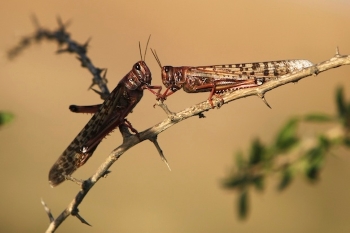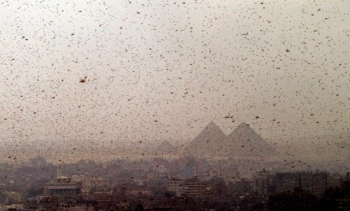
 |

 |
After Mak•âhꞋ #7: Bâ•râdꞋ,![]() é‑‑ä said to Mosh•ëhꞋ,
é‑‑ä said to Mosh•ëhꞋ,
Come
to Par•ohꞋ. For I
have goaded the arrogant-defiance that Par•ohꞋ harbors in his heart, and his a•vâd•imꞋ harbor in their hearts, in order that I
may demonstrate My ōt•ōtꞋ in their midst – and in order that you shall retell in the ears of your child and your children's children
what I
have done to Mi•tzᵊraꞋyim and the ōt•ōtꞋ that I
have performed among them so that you may know that I
am é‑‑ä."
So Mosh•ëhꞋ and A•ha•ronꞋ came to Par•ohꞋ, telling him, "Thus says é‑‑ä, ël•oh•imꞋ of the Ha•birꞋu,
"How long will you continue refusing to humble yourself before Me? send forth My am so they may do a•vōd•âhꞋ for Me! If you refuse to send forth My am, look, tomorrow I
will bring swarms of ArᵊbëhꞋ
into your border. They shall cover the eye of hâ-ârꞋëtz so that you won't be able to see hâ-ârꞋëtz. They shall eat whatever grain survived the Bâ•râdꞋ
and devour every tree you grow in the field. They will fill your houses and the houses of your a•vâd•imꞋ; the houses of all Mi•tzᵊraꞋyim the likes of which have never been seen, neither by your fathers nor their fathers, since the day they first appeared upon the a•dâm•âhꞋ to this day."
Then he turned and walked out from Par•ohꞋ.
Finally, Par•ohꞋ's a•vâd•imꞋ spoke up to him. "How long shall this entrap us? send forth these men out and let them do the a•vōd•âhꞋ of é‑‑ä their ël•oh•imꞋ. Don't you see that Mi•tzᵊraꞋyim is lost?"
So Mosh•ëhꞋ and A•ha•ronꞋ were summoned again to Par•ohꞋ, and he told them, "Go! Do a•vōd•âhꞋ for é‑‑ä your ël•oh•imꞋ. But who, specifically, is going?"
"Our youths, our seniors and our daughters, our tzon and our cattle," Mosh•ëhꞋ replied. "We will all go, for we have a Khag é‑‑ä."
"Let it be so, may your é‑‑ä be with you when I send forth you and your toddlers." Par•ohꞋ acquiesced. "But watch out, because wrong is written in![]() your face. Don't do that! The warriors
your face. Don't do that! The warriors![]() may go and do the a•vōd•âhꞋ of your é‑‑ä because that is what you
may go and do the a•vōd•âhꞋ of your é‑‑ä because that is what you![]() requested." And they were chased out from before the face of Par•ohꞋ.
requested." And they were chased out from before the face of Par•ohꞋ.
 sekhem (r) 0350x297.jpg) |
"Stretch forth your hand over ërꞋëtz Mi•tzᵊraꞋyim in the ArᵊbëhꞋ
that it may ascend upon ërꞋëtz Mi•tzᵊraꞋyim and it will devour all the grain of hâ-ârꞋëtz, everything that survived the Bâ•râdꞋ."
So Mosh•ëhꞋ stretched forth his scepter over ërꞋëtz Mi•tzᵊraꞋyim and é‑‑ä guided a ruꞋakh shâ•râvꞋ from out of the east![]() into hâ-ârꞋëtz all day and all night.
into hâ-ârꞋëtz all day and all night.
 |
When morning came, the ruꞋakh from out of the east carried with it ArᵊbëhꞋ from the Sin•aiꞋ.![]() So the ArᵊbëhꞋ
So the ArᵊbëhꞋ![]() ascended upon all of ërꞋëtz Mi•tzᵊraꞋyim, and stayed within all of the borders of Mi•tzᵊraꞋyim.
ascended upon all of ërꞋëtz Mi•tzᵊraꞋyim, and stayed within all of the borders of Mi•tzᵊraꞋyim.
These were heavy, black clouds of swarms. Never before had there been anything like these heavy swarms of ArᵊbëhꞋ,![]() nor since. For they covered the eye of all of hâ-ârꞋëtz, and they ate all of the grain of hâ-ârꞋëtz and all of the fruit of the trees that had survived the Bâ•râdꞋ.
nor since. For they covered the eye of all of hâ-ârꞋëtz, and they ate all of the grain of hâ-ârꞋëtz and all of the fruit of the trees that had survived the Bâ•râdꞋ.![]() Nothing green remained, not a tree nor a grain in the field, throughout the entirety of ërꞋëtz Mi•tzᵊraꞋyim.
Nothing green remained, not a tree nor a grain in the field, throughout the entirety of ërꞋëtz Mi•tzᵊraꞋyim.
Then Par•ohꞋ hurried to summon Mosh•ëhꞋ and A•ha•ronꞋ saying, "I misstepped to é‑‑ä your ël•oh•imꞋ and to you. Now, however, please bear my misstep this once and you![]() intercede to é‑‑ä your ël•oh•imꞋ that he will just take this death from over me."
intercede to é‑‑ä your ël•oh•imꞋ that he will just take this death from over me."
Then he went forth from Par•ohꞋ and interceded to é‑‑ä.
After a passing high pressure weather system had powered an easterly wind that blew the ArᵊbëhꞋ from the Sin•aiꞋ into central Mi•tzᵊraꞋyim, the winds calmed to a typical sea breeze out of the NW, allowing the ArᵊbëhꞋ to remain and thrive. Now, however, é‑‑ä reversed![]() the prevailing sea-ruꞋakh as a cold front moved in behind the shâ•râvꞋ. The leading edge of the cold front powered southerly winds,
the prevailing sea-ruꞋakh as a cold front moved in behind the shâ•râvꞋ. The leading edge of the cold front powered southerly winds,![]() driving the swarms of ArᵊbëhꞋ
driving the swarms of ArᵊbëhꞋ![]() north, out of the capital of Ankh-Tawi,
north, out of the capital of Ankh-Tawi,![]() northward toward Yâm Suph and the Mediterranean Sea. Not one live ArᵊbëhꞋ
northward toward Yâm Suph and the Mediterranean Sea. Not one live ArᵊbëhꞋ![]() was left in all of the borders of Mi•tzᵊraꞋyim!
was left in all of the borders of Mi•tzᵊraꞋyim!
But, Par•ohꞋ mused, every shâ•râvꞋ, every summer, although not so severe, behaves this way. Thus, é‑‑ä again goaded the arrogant-defiance that Par•ohꞋ harbored in his heart; and he did not send forth Bᵊn•eiꞋ-Yi•sᵊrâ•eilꞋ out.

Optional parental preparation:
Can the child (you?) recite from memory the Mak•ōtꞋ (Hebrew terms) so far? … ,ãÌÈí
What's the difference between a grasshopper and a locust? Which species of locusts are kâ•sheirꞋ?
What does "goad" mean? "Arrogance"? "Defiance"?
What does "harbor in one's heart" mean?
What is the "eye of the land"? (The approximate center)
What does "written in your face" or "your face betrays you" mean?
The prevailing wind in the southern and eastern Mediterranean countries is out of the NW.
Due to the rotation of the earth, weather systems lag behind the rotation, thereby proceeding (relative to a landmark) in a west-to-east direction.
In the Northern Hemisphere, the Coriolis effect causes high pressure warm fronts, pushing air away, to kick up CW winds, while low pressure cold fronts, drawing air in, whip up CCW winds.
A strong wind out of the east, therefore, would be caused by the passage, along the southern Mediterranean Sea, off the coast of Egypt, of a particularly severe high pressure (warm front) system. The bottom of the high pressure system would drive winds out of the east from the Sin•aiꞋ into Egypt. (The top of a cold front is unlikely to come out of the Central African desert into Egypt.) ![]()
Questions you might anticipate that your child might raise and be prepared to discuss:
What is a swarm?
What does "entrap" mean?
What are youths?
What are seniors?
What does "acquiesce" mean?
What's the difference between "chase" and "chase out"?
![]()
 |
 |